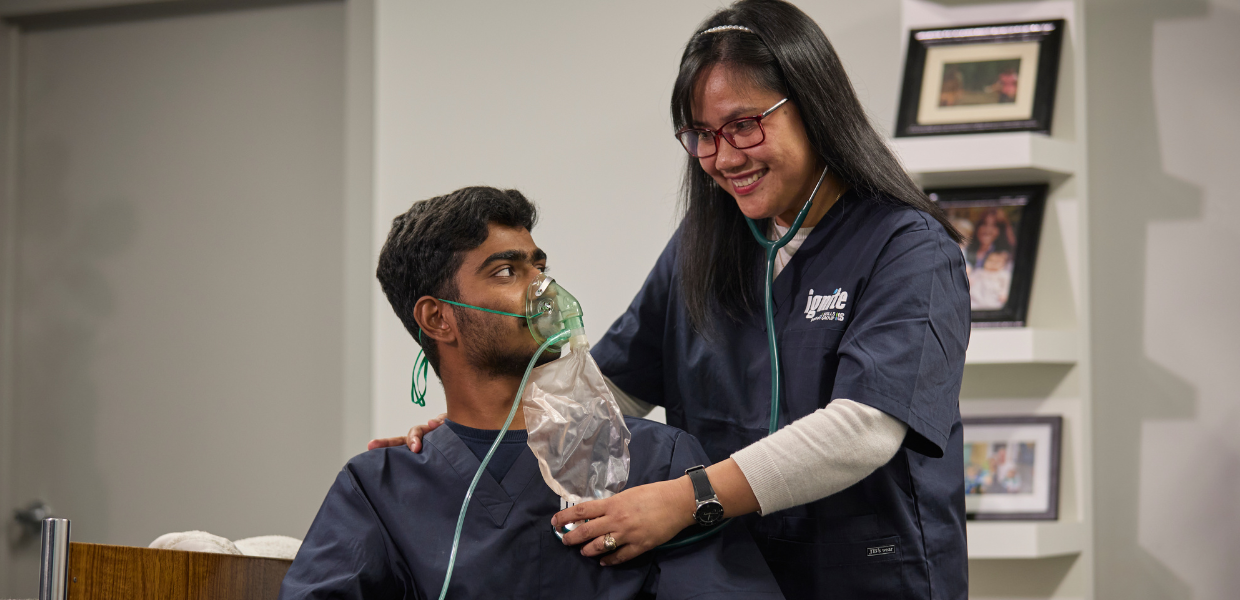Health and Wellbeing (Social and Community Services)
Start a career in supporting the health and wellbeing of individuals, family, and the wider community
A critical challenge in the healthcare sector is developing and building a workforce that can meet the dynamic workforce needs of the industry. Relevant and/or additional qualifications provide the necessary attributes to rise to this challenge and stand out. By investing in your professional development with Skills Ignite, you can enhance your skills, broaden your knowledge, develop the right attitudes for the sector and thereby increase your value in the workplace. Our nationally recognised Healthcare Level 4 qualification boosts your competencies and drives your growth, positioning you as a top-tier professional and making you more attractive to leading employers.
There are flexible delivery modes that cater to learner needs and situations. With the chosen strands the employment opportunities are diverse.
About the qualification
The New Zealand Certificate in Health and Wellbeing (Social and Community Services) Level 4 is suitable for those who are already working in the healthcare industry or those who intend to be employed in the industry to start a career in supporting the health and wellbeing of people, family and/or whānau, and the wider community.
Graduates of this qualification will be able to work in health and wellbeing roles such as health and/or wellbeing field officers, health and/or wellbeing coaches, community health workers, mental health and addiction support workers, addiction programme facilitators, day programme facilitators, caregivers, and residential support workers.

Ready to Enrol?
- Download and complete the Enrolment Form
- Provide a certified copy of your New Zealand or Australian passport, or your birth certificate
- Email the completed documents to [email protected]
What will I learn?
The New Zealand Certificate in Health and Wellbeing (Social and Community Services) Level 4 covers these core modules –
Module 1: Aotearoa NZ Health and wellbeing sectors- Objectives and purposes.
- Health strategy
- Māori, Pacific Strategy
- People with disabilities Health strategy
Module 2: Engagement and communication principles in healthcare settings.
- Multidisciplinary communication
- Difficult conversations
- Creating safe and inclusive environment for constructive engagement
Module 3: Cultural awareness, competency and cultural safety in healthcare practice.
- Māori values may include but are not limited to tikanga, rangatiratanga, kaumātuatanga, whanaungatanga, manaakitanga
- Guiding principles of Te Tiriti o Waitangi
- Importance of bicultural approach to health and wellbeing settings
- Importance of Cultural awareness and competency in health and wellbeing settings
Module 4: Leadership, professional, safety & quality principles in health and wellbeing settings.
- Tools of self-reflection
- Critical thinking strategies
- Principles of professionalism, ethics and quality in professional standards
Module 5: Community health support work/ Mental health and addiction support.
- Knowledge of relevant common health conditions/ mental health conditions and addiction disorders (short description, features, risk factors, barriers for support)
- Impacts of these conditions on the overall/ holistic health of the people living with these conditions
- Māori and Pacific health and wellbeing policies and initiatives for people living with mental health conditions
- Your contribution as a support person in alignment with these initiatives and knowledge of key service philosophies
- Relevant models and approaches of care and support for people living with mental health conditions
Module 6: Clinical placement- evidence based support practices in health care setting.
Module 7: Clinical placement- evidence based support practices in community health practices/ mental health settings.
What jobs can I apply for after completing this course?
- Health and/or Wellbeing field officers
- Health and/or Wellbeing coaches and community health workers
- Caregivers, and support workers
- Mental health strand- as mental health and addiction support workers
- Addiction programme facilitators
- Day programme facilitators and residential support workers
Does this include work experience?
Yes, 320 hours of clinical placement.

